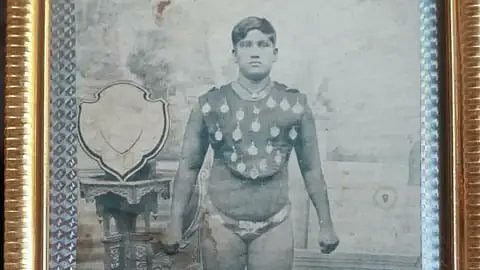
- Union Budget 2026
- Home
- NewsGram USA
- India
- न्यूजग्राम
- World
- Politics
- Entertainment
- Culture
- Lifestyle
- Economy
- Sports
- Sp. Coverage
- Misc.
- NewsGram Exclusive
- Jobs / Internships

Key Points:
Hamida Banu was India's first professional female wrestler who rose to fame in the 1940s and 50s.
She claimed to have defeated over 300 men by the time she was in her 30s. At the peak of her fame she issued a challenge saying anyone who defeated her could marry her, but no one did.
Despite her fame and popularity, she faced immense backlash for her choices. Even today her legacy remains forgotten inspite of her being a superstar in Indian sports.
Hamida Banu made history as India’s first professional female pahalwan and a star of the 1940s-50s wrestling scene.
Banu was born in the early 1900s to a wrestling family in Mirzapur, Uttar Pradesh. Despite her family’s occupation, they did not support her dream of wrestling. She quickly left Mirzapur, running away to Aligarh to pursue her passion. Here she trained under local wrestler Salam Pahalwan, starting her long journey to superstardom.
As her prowess developed, Banu won the title “The Amazon of Aligarh.” She travelled across Uttar Pradesh and Punjab, claiming wins and fans wherever she went. Many of her feats and claims about her made headlines as well. Banu was said to be 5’3” and 108Kg, and eat 2.8 litres of soup, 5.6 litres of milk, 1.8 litres of fruit juice, a fowl, nearly 1kg of mutton and almonds, half a kilo of butter, 6 eggs, two big loaves of bread, and two plates of biryani daily.
In 1944, more than 20,000 people came to watch Banu fight Goonga Pahalwan in Mumbai, according to a report by the Bombay Chronicle. Right before the fight was to take place, Goonga made some unreasonable demands for extra money and time that led to it being cancelled. Angry fans vandalized the stadium in protest.
In 1954, she issued an open challenge to pahalwans across the country – her most daring and inspiring antic – saying, “beat me in a bout and I’ll marry you.” But no one ever did.
She faced off against three of the country’s top wrestlers that year, winning the first two fights with ease. For her third fight, she travelled to Baroda, Gujrat to wrestle against Chhote Gama Pahalwan, who was patronized by the Maharajaha of Baroda. The city was pulsing with excitement – Banu’s face was plastered on banners and posters across the city. By this time, Banu claimed to have won over 300 matches.
Unsurprisingly, Chhote withdrew at the last minute, saying he would not fight a woman. In his place, Banu faced Baba Pahalwan in a fight lasting only 1 minute and 34 seconds. A report by the Associated Press read, “the referee declared Pahalwan out of her wedding range.”
Banu had faced this many times before. Many of Banu’s opponents withdrew before their fights, perhaps frightened by her reputation and afraid of losing to a woman. Others accused her of fixing matches and refused to fight her at all. Many times, fans even booed and stoned her after she defeated a male opponent.
Even when she complained to the Maharashtra CM Morarji Desai about an unofficial ban on her matches, he replied that it was not due to her gender but because of complaints of match fixing.
As a Muslim woman trying to make it in a male-dominated field during a conservative time, Banu faced many challenges throughout her career, fighting for herself at every step. Men mocked and belittled her during her career. Even today, despite her fame, there is very little information available about her. One writer, however, did capture a true glimpse of Banu. Qurratulain Hyder, an Urdu feminist writer, mentions in her book Daalan Wala how her domestic helper Faqira had gone to watch a wrestling match in Mumbai and returned saying no one had been able to defeat "the lioness".
In 2023, BBC Urdu’s Neyaz Farooquee, struck by Banu's story, tried to trace the life of one of India’s most iconic sports icons.
In 1954, after her fight in Baroda, Banu was at the height of her fame. Later that year, in Mumbai, she defeated Vera Chistilin, a Russian boxer known as the “female bear”. After this she announced that she would go Europe to fight wrestlers there but soon disappeared.
Farooque traced the rest of Banu’s life through newspapers, books, and the accounts of her relatives and associates.
According to Banu’s grandson, Feroz Sheikh, she lived with Salam Pahalwan in Aligarh, often travelling to Mumbai and Kalyan for business. Pahalwan’s daughter, Sahara, claimed that the two were married, but Sheikh disagrees.
According to Sheikh, when Banu had announced her plans of going to Europe, Pahalwan did not like the idea. “To stop her, he beat her with sticks, breaking her hands,” Sheikh claims. A neighbour, Rahil Khan, supported the account, saying that her legs were broken in the incident as well and that it took her years to walk again without a cane.
Eventually, Banu moved to Kalyan with her grandson, while Pahalwan stayed in Aligarh. Towards the end of her life, Banu supported herself by renting out buildings and selling milk and homemade snacks.
“Her last days were difficult,” said Sheikh, who lived with her until her death in 1986. Afterwards, she and her legacy were relegated to obscurity.
In 2024, a year after Farooque's feature on Banu, Divya Negi, a Bangalore-based artist, honoured her with a Google Doodle. This brought her back into the limelight after nearly 70 years, and finally, recognition for all her work forging a path for women in the Indian sports world.
Also Read:
